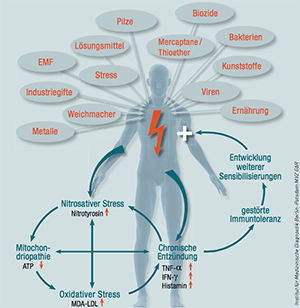Environmental dentistry is a new interdisciplinary branch of dentistry for dentists, doctors of other specialisations and dental technicians. At the heart of environmental dentistry is the comprehensive dental treatment of chronically ill patients, along with the implementation of individual preventive treatment plans with the goal of avoiding or easing chronic inflammatory illnesses – including those far from the oral cavity.
An increasing number of patients suffer from one of the classic systemic inflammatory illnesses. The most common are allergies, diabetes, rheumatic illnesses, gastro-intestinal diseases, osteoporosis, chronic infections or circulatory disorders.
Why these illnesses are on the increase is unknown. It is assumed that several individual triggers and cofactors are significant as catalysts of chronic inflammatory illnesses. In our modern society we increasingly have to cope with more aggravating factors, which in sum represent the trigger of the inflammation.
Good dentistry can help
Dentistry is not possible without the introduction of foreign materials into the organism. However each material can cause an inflammatory focus if the patient has an allergic reaction to it or if, due to insufficient processing, high concentrations of constituents of the material affect the organism. On the other hand, dentists can help detect hidden inflammatory foci and eliminate them. A scientifically based interdisciplinary and holistic treatment can help eliminate inflammatory triggers and in this way relieve the organism.
Chronic Illnesses
Everyone goes around with a systemic inflammation and this presents the essential impetus for the progress of disease. Genetics does not explain the rapid increase in inflammatory illnesses. Today it is known that a lot of individual triggers and cofactors are significant as a catalyst for chronic inflammatory illnesses. In our modern society we increasingly have more frequent and more complex foreign matter to contend with which in sum represent the inflammatory triggers and consequently, based on genetic tendency and biochemical changes cause the „widespread diseases“. Modern medicine also plays its part. Interventions in the biological integrity of the person have become almost daily routines. What is meant here are the foreign materials in dentistry, orthopaedics or surgery, drug and hormonal treatments, and treatments that are meant to stimulate or suppress the immune system. It is often forgotten, that every intervention in the organism has an impact on the entire body.
Significance for dentistry
Any material may not be tolerated by the individual and can represent a trigger for chronic inflammation. Every material interacts with the organism. Since every organism reacts differently, material suitable for the patient and the best treatment option for the individual must be chosen pre-emptively. On the other hand, dentists are also confronted with the situation that more of their patients are already suffering from chronic inflammatory illnesses. For these patients they must work closely with GP’s and specialists to search specifically for substances that are not tolerated or for confounding factors. The teeth and periodontium frequently present the source of the inflammation that impacts on the whole organism.
Procedure in our practice
Following a detailed interview about the health of the patient as a whole, the oral cavity is thoroughly examined for factors which by a toxicological long term stress or by activating the immune system could bring about an inflammatory process. This could be something as simple as misaligned wisdom teeth, a hitherto undetected chronic periodontal disease, a hitherto undetected inflammation on the root apex, one or more teeth that are dead at the roots or a filling, crown, bridge, prostheses or implant material that is immunologically unsuitable for the patient. However bonding materials like adhesives and dental cements can also represent aggravating factors that are not to be underestimated. All this toxicological, immunological, and environmental specialised knowledge needs to be determined. The environmental dentist has the expertise to be able to set diagnostic and therapeutic priorities. Therefore, alongside the dental diagnostic an environmental dental treatment also takes place so that ultimately individually meaningful solutions can be found for each respective patient.




